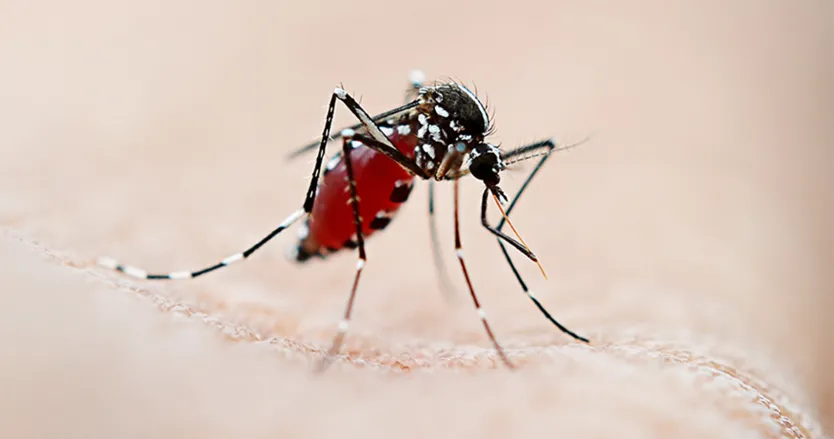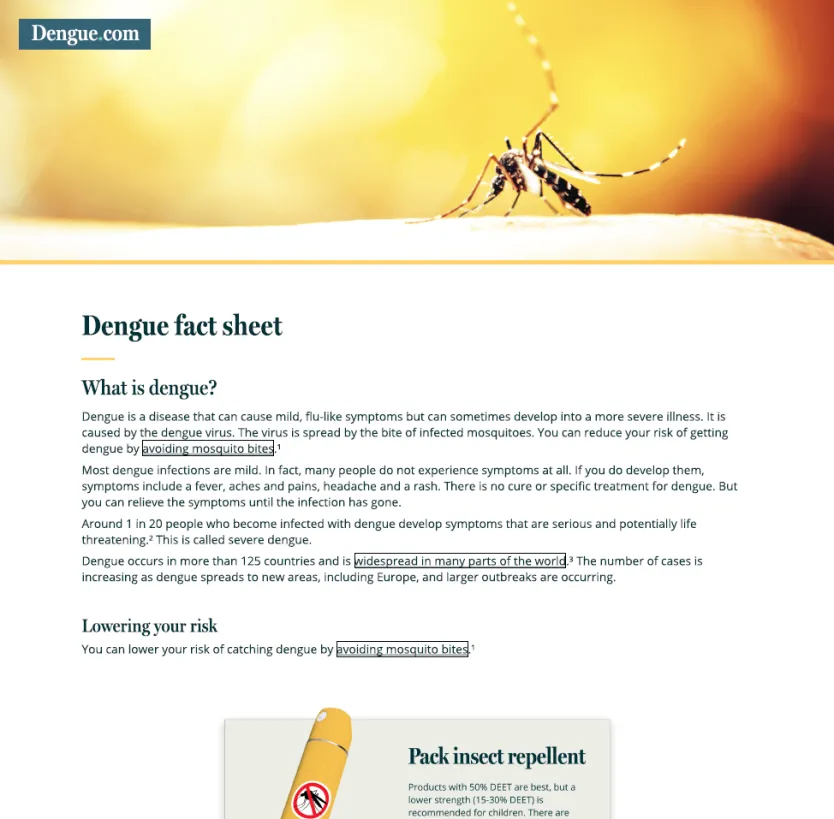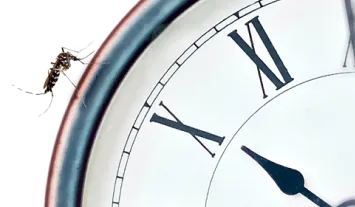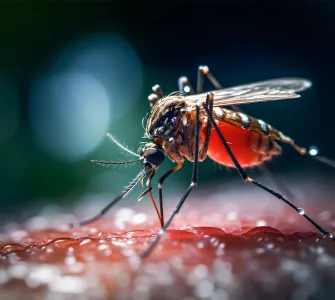What is dengue?

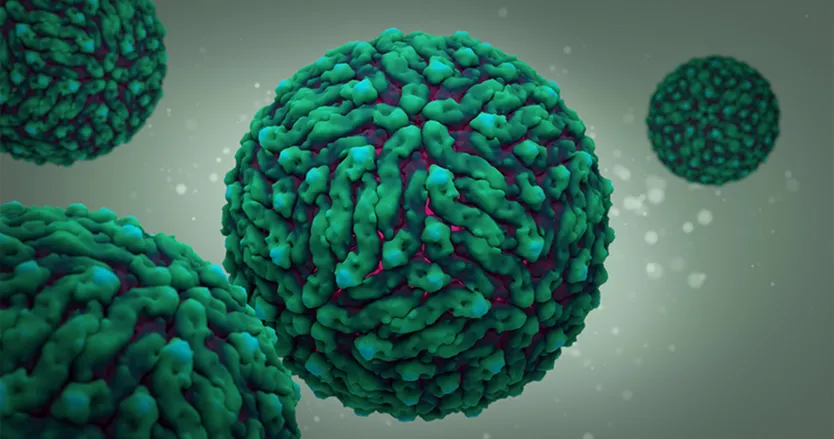
Dengue is a viral infection caused by the dengue virus (DENV) which is transmitted to humans through the bite of infected mosquitoes.1 These mosquitoes (mainly of the species Aedes aegypti and Aedes albopictus) can transmit each of the four different dengue virus serotypes.2,3 This means you can be at risk of getting dengue more than once. People who get infected a second time (with a different serotype) are more likely to develop severe symptoms compared with their first infection.4
Though often mild, dengue can be life-threatening
Some of the symptoms of dengue can be flu-like such as severe headache, pain behind the eyes and fever.1,5 The severe joint pain that dengue can cause is why it has also been referred to as "breakbone fever”.6,7 Thankfully, most people (about 3 out of 4) do not develop symptoms after becoming infected.2,8 However, around 1 in 20 people with any discernible symptoms progress to severe dengue, a dangerous condition with severe bleeding and organ damage.2 It can occasionally be deadly too.1 Learn more about severe dengue here.
A growing concern…
Dengue is a growing concern; the number of reported cases are rising at an alarming rate and the disease continues to spread to new areas including in Europe where explosive outbreaks are occurring.1,9,10 Dengue is breaking records in parts of the Americas too and emerging in new African countries.10-12 Disease outbreaks can overwhelm health systems causing substantial sickness and death.13
Unfortunately, dengue’s spread shows no signs of slowing. Factors such as climate change and increased urbanization look set to further drive its expansion into new areas.14 International travel is becoming an increasingly important factor too; as more people travel abroad, they can not only get sick with dengue at their destination (if it is dengue-endemic), but they can also spread it back home when they return.15
Dengue can place a huge financial burden in the areas it is present.16 People with symptoms may need time off work and face substantial treatment costs (depending on how severe their symptoms are).16 Aside from its physical symptoms dengue has been linked to psychological symptoms such as depression, anxiety and stress in some cases.17
Turning the tide against dengue
There is no specific treatment for dengue and unless it becomes severe, it is generally managed with rest, drinking fluids and pain relief (though, if you need treatment, you should always see your doctor for prompt medical attention or specific advice).1,5 Since no cure is available, preventing dengue is especially important; measures to avoid mosquito bites like using insect repellent and nets help reduce the risk of infection.1
Communities in endemic areas are crucial in helping control mosquitoes and the spread of dengue.18 For example, campaigns encouraging communities to search for, and clear mosquito breeding sites, have been successful in the past.19 There are examples, where organizations and governments have joined forces at times to successfully educate communities in reducing the impact of dengue (for example, through the elimination of mosquito breeding sites).20 Vaccinations too, may contribute to a multi-pronged approach to reduce the global burden of dengue, both for those living in, and traveling to, endemic areas.10,21
Is dengue in your area? Or a destination you are traveling to? Visit Where is Dengue to find out.
Want to know your risk when it comes to dengue? Visit Weighing up your risk of dengue.
Speak to your doctor to find out more about dengue. Seek medical attention immediately if you think you might have dengue.
References
WHO. Available at: https://www.who.int/news-room/fact-sheets/detail/dengue-and-severe-dengue Accessed November 2023.
Centers for Disease Control and Prevention. Available at: https://www.cdc.gov/dengue/healthcare-providers/clinical-presentation.html Accessed December 2023.
Centers for Disease Control and Prevention. Available at: https://www.cdc.gov/dengue/transmission/index.html. Accessed December 2023
WHO. Available at: https://www.who.int/emergencies/disease-outbreak-news/item/2023-DON481. Accessed November 2023.
NHS. Available at: https://www.nhs.uk/conditions/dengue/. Accessed November 2023.
Mitraka E, et al. PLoS Negl Trop Dis. 2015;9(2):e0003479.
The Daily Telegraph. Available at: https://www.telegraph.co.uk/global-health/science-and-disease/bangladesh-hospitals-at-breaking-point-in-dengue-crisis/ Accessed December 2023.
Schaefer TJ, et al. In: StatPearls [Internet]. Available from: https://www.ncbi.nlm.nih.gov/books/NBK430732/. Accessed December 2023.
Wang X, et al. Can J Infect Dis Med Microbiol. 2021;2021:6699788.
Lancet Reg Health Am. 2023;22:100539.
WHO. Available at: https://www.who.int/emergencies/disease-outbreak-news/item/2023-DON491. Accessed December 2023.
WHO. Available at: https://www.who.int/emergencies/disease-outbreak-news/item/2022-DON387. Accessed December 2023.
Leung XY, et al. PLoS Negl Trop Dis. 2023;17(2):e0010631
Messina JP, et al. Nat Microbiol. 2019;4(9):1508-1515
Wilder-Smith A. Dengue infections in travellers. Paediatr Int Child Health. 2012;32 Suppl 1(s1):28-32.
Weerasinghe NP, et al. BMC Health Serv Res. 2022;22(1):657.
Gunathilaka N, Int J Ment Health Syst. 2018;12:20.
World Health Organization. Available at: https://www.who.int/activities/engaging-communities-to-sustain-dengue-vector-control# Accessed December 2023.
Tapia-Conyer R, et al. Paediatr Int Child Health. 2012;32 Suppl 1(s1):10-3.
World Health Organization. Available at: https://www.who.int/about/accountability/results/who-results-report-2020-mtr/country-story/2022/community-engagement-for-sustainable-dengue-outbreak-prevention-and-control Accessed December 2023.
Thomas SJ NPJ Vaccines. 2023;8(1):55.

















